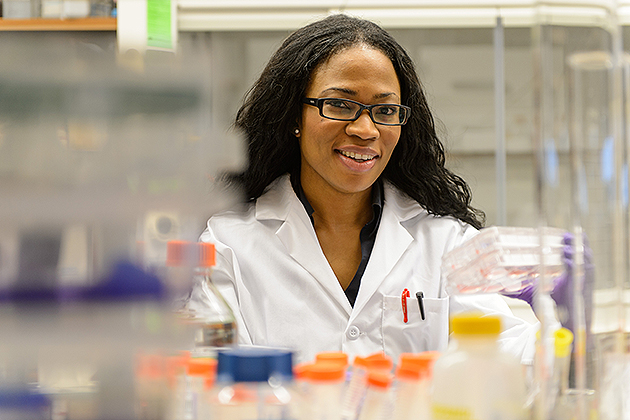
When Sophia Nnenna Ononye left her home country of Nigeria to pursue an education in the United States with hopes of becoming a physician, she never dreamt that her fascination with science would lead her so deep into the realm of pharmaceutical research. Now a graduate student in medicinal chemistry at UConn, Ononye is working to develop anti-cancer agents that could potentially pave the way for more effective cancer therapy in the future.
Most anti-cancer therapeutics on the market today cause damaging side effects, including hair loss, nausea, and decreased immune function. Ononye says she hopes to develop a second generation library of drugs that are more potent against cancer cells and less toxic to the patient.
“I have always felt that science is a calling for me,” she says. “I love the process of drug discovery and development.”
Using the existing library of tropolone natural product derivatives in the lab of UConn pharmaceutical sciences professor Amy C. Anderson, who conducts antibiotic research, Ononye works to evaluate the mechanism of action of these drugs within the context of anti-cancer functions. She says this is brand new territory in drug investigation that has the potential to establish a foundation for the improvement of anti-cancer therapies.
Ononye’s research involves evaluating the mechanism of the tropolone drugs in inhibiting histone deacetylase (HDAC), a class of enzymes involved in DNA expression. In inhibiting HDAC, these tropolone natural product derivatives could induce an array of effects, increasing or suppressing the expression of genes. These effects are useful in facilitating transcription of tumor suppressor genes, but toxic in silencing genes that are involved in the proliferation of healthy cells. Ononye is looking to improve the specificity of the tropolone natural product derivatives by analyzing their effects within non-tumorigenic, solid tumor, and hematological cancer cell-lines.
Ononye holds a bachelor’s degree with honors in chemistry with a concentration in biochemistry from Bowling Green State University; a master’s degree in public health from the University of Toledo; and has worked for Pfizer Inc. as an analytical development scientist. She also worked on the Lucas County Initiative to Improve Birth Outcomes in Ohio, facilitating access to community health workers for young women in need of prenatal and social services.
She recently received the Dana-Farber/Harvard Cancer Research Award for a presentation of her thesis research at the 2012 New England Science Symposium at Harvard Medical School, and was recognized at the annual meeting of the American Association for Pharmaceutical Scientists (AAPS) for an AAPS-AFPE fellowship award in pharmaceutical sciences.
While the prospect that her research may improve the effectiveness of cancer treatment in the future is gratifying for Ononye, she particularly appreciates the opportunity to work in a field that fosters her growth as a person.
“The best part about this whole process is not just the opportunity for professional development, but for personal development through the investment of your time into something that is such a challenge,” Ononye says. “It brings out the best in you.”



